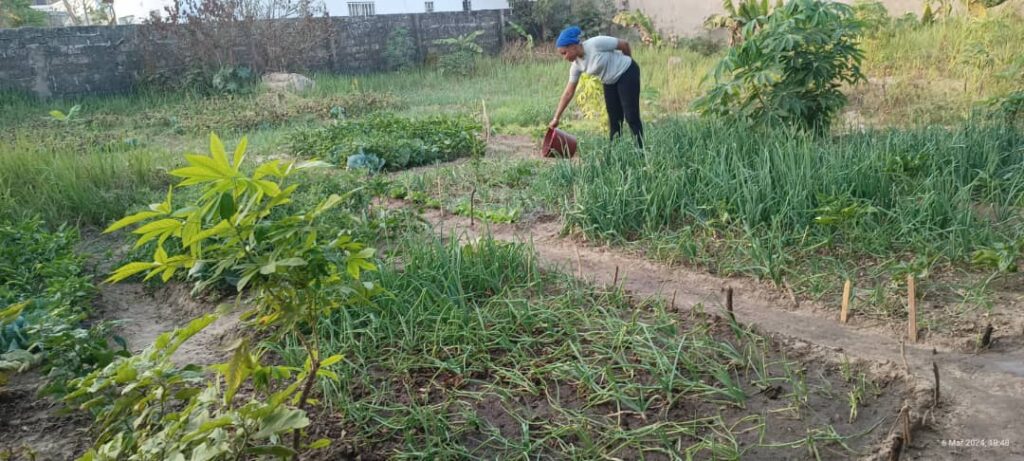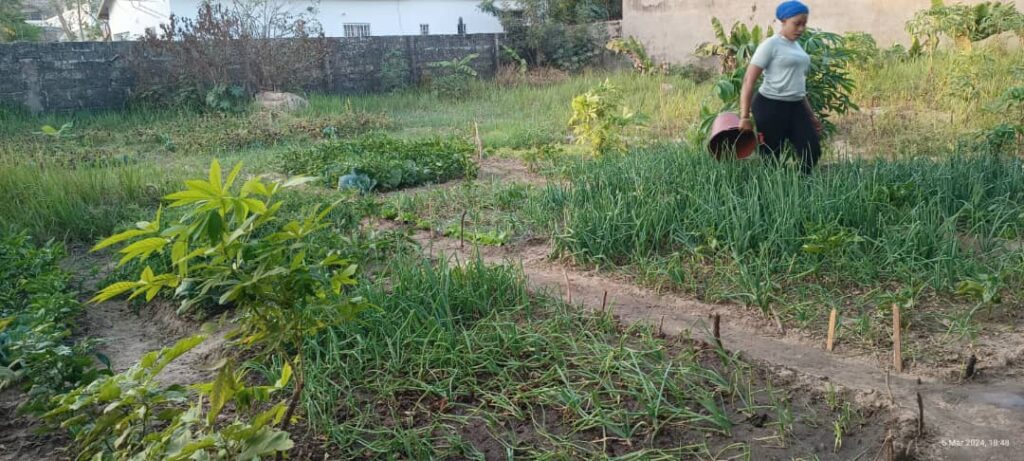
Aminata S. Kuyateh is a remarkable woman whose passion for gardening and dedication to journalism seamlessly intertwine in a way few can imagine.
From working alongside her mother in the garden plots of her youth to reporting on critical issues in the newsroom, Aminata has built a life around two seemingly different worlds.
Yet, for her, both pursuits share a common mission, to contribute meaningfully to her community and promote self-sufficiency in The Gambia.
“I’m inspired to venture into entrepreneurial gardening because I believe agriculture is the backbone of any country,” Aminata says, her words reflecting the wisdom she has gained over the years. “It’s also a source of income that can alleviate poverty.”
Every morning, after praying Fajr (the dawn prayer), Aminata rushes to her garden, just a kilometre from her home in Bakau. It’s a simple yet vital routine, but her life as a journalist often complicates it.
“Sometimes my schedule changes if I have an early morning assignment,” she explains. “I’ll cover the story, return to the office, submit my report, and then rush back home to water my vegetables.”
Unlike many city dwellers, Aminata doesn’t have the luxury of off days. When she’s not at the office, she’s tending to her garden, ensuring her vegetables thrive despite the challenges of balancing her dual commitments. This juggling act can be stressful, but Aminata remains steadfast.

“It’s challenging because sometimes my vegetable beds will go a whole day without water,” she admits, reflecting on the difficulty of managing both her job and her passion.
As an official reporter covering the Local Government Commission’s investigation into local councils, Aminata is often stretched thin. The commission, now in its 11th month, demands much of her attention. Yet even these professional hurdles don’t overshadow her dedication to the land.
“There was a time when I had early coverage at the OIC [summit]. I rushed to water my vegetables, but by the time I arrived at the conference in Bijilo, the event had already started. The vice president was there, and I had to beg the security officer to let me in.”
This incident encapsulates the challenge of balancing the demands of her profession with her entrepreneurial aspirations. Yet Aminata remains resolute in her desire to one day pursue gardening full-time.

“If I had the land, I would quit journalism and dedicate myself entirely to gardening,” she says with determination.
As The Gambia strives for food self-sufficiency, Aminata firmly believes that agriculture could play a transformative role.
“If the government gives agriculture the necessary attention, resources, and implementation, we can achieve self-sufficiency in food,” she asserts.

While she acknowledges the government’s efforts, she is also mindful of the challenges ahead. “The government has prioritised agriculture,” she notes, “but the budget allocation is still too small. Many people are turning to agriculture because it’s one of the fastest ways to make money.”
Aminata S. Kuyateh is a woman driven by purpose, a dedicated journalist and passionate gardener with an unwavering belief in the power of agriculture to change lives.
Economist view
Dr. Ousman Gajigo, an economist highlights the untapped potential of gardening to empower women, reduce poverty, and improve food security in The Gambia. He believes that vegetable production is transforming households and communities as more women engage in the practice.

“Gardening is a high-value agricultural activity. Even small parcels of land generate substantial revenue, significantly supplementing household incomes and reducing poverty,” Dr. Gajigo says.
He notes that greater vegetable production is lowering market prices, increasing the consumption of nutritious food, and addressing food insecurity.
“The current high prices of vegetables in Gambian markets are a result of low supply, which is caused by the many difficulties faced by women gardeners. Addressing these challenges will bring prices down to affordable levels and improve household nutrition,” he explains.
Dr. Gajigo identifies several obstacles, including limited access to quality seeds, fertilisers, irrigation, and proper storage.
“Women face tremendous difficulties. Livestock destroy their crops during the dry season, and perishable produce like tomatoes rot quickly without cold storage. These challenges make vegetable farming less rewarding than it could be.”
He criticises the lack of government support:”The horticultural sector is largely neglected. Government policies barely support vegetable production, leaving women to rely on philanthropists and NGOs, which is insufficient. The cost of addressing these barriers is low and could easily be covered in the national budget”
Dr. Gajigo also highlights the environmental benefits of gardening: “Vegetable farming requires less land and discourages deforestation. It offers a sustainable livelihood that preserves our environment while boosting incomes.”
He believes that solving these issues will unlock enormous potential: “Once these constraints are addressed, gardening can become a viable and transformative economic activity, not only for women but for the entire country.”
By Adama Makasuba










Recent Comments